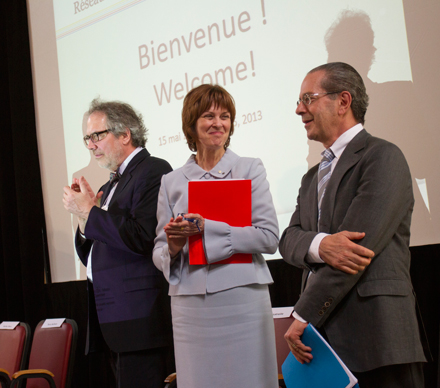
Dollarama founder leads way with $30-million gift
By Neale McDevitt
You don’t have to know Larry Rossy to understand that family is an essential part of who he is.
On Wednesday, Rossy, the founder and CEO of Dollarama Inc. and the Rossy chain of discount department stores, sat on stage at Redpath Hall for the official launch of the Rossy Cancer Network (RCN) – an initiative that aims to enhance cancer care, increase survival rates and reduce the burden of the disease to patients, their families and society at large. In the front row sat his wife, Cookie, his children and three of his seven grandchildren.
Understandably, all of the distinguished speakers paid tribute to Rossy, as his foundation – the Larry and Cookie Rossy Family Foundation (LCRFF) – has just donated $30 million to the RCN. That generous sum was the catalyst for three partner hospitals – the McGill University Health Centre, the Jewish General Hospital and St. Mary’s Hospital – to also contribute to the RCN through various fundraising intiatives, bringing the total investment to $58 million.
The RCN, which forms part of the Quebec cancer network and is aligned with Quebec’s recently announced action plan for cancer care, builds on the strengths of partners based on a shared vision, mission and rigorous plan for tracking patient experiences and management of the disease, and improving outcomes. It will be supported by resources, tools and initiatives that are standardized across the institutions, such as common patient-satisfaction surveys, information technology and best practices in disease management.
Not surprisingly, when it came time for Rossy to speak to the packed house, he began with a family anecdote, sharing a recent conversation he had with his 4-year-old granddaughter, who was astounded to find out her grandfather was 70 years old. “I could see her brain churning numbers as she looked at me in amazement… and she looked at me and said ‘Grandpa did you really start at one?’ ”
That strong sense of family is in large part what motivated Rossy to target cancer with his Foundation’s gift. “I’ve been a lucky man throughout my life and I thought it was time to make a meaningful contribution to the community,” he told reporters at the media scrum that followed the launch. “We chose cancer because this is the disease that has affected our family most over the years… My father, friends, other family members… cancer has hit us the [hardest].”
But, as Rossy reiterated over the course of the proceedings, his family is far from alone. Cancer kills more people in Canada than any other disease. Every single day, 130 Quebecers are diagnosed with cancer, or more than 47,000 each year.
As pointed out by Dr. David Eidelman, Vice-Principal of Health Affairs and Dean of the Faculty of Medicine, of those 47,000 people, more than 11,000 were diagnosed in the partner hospitals that make up the Rossy Cancer Network, with thousands more depending on them for cancer care and services. “By leveraging the oncology expertise of our doctors, nurses, allied health professionals, researchers and support staff across the spectrum of the disease, we are taking a major step forward in the fight against cancer,” said Eidelman.
It is fairly common practice that a patient is diagnosed in one hospital but will receive treatment at another that specializes in particular types of the cancer. In the past, however, communication between the hospitals hasn’t always been so efficient, meaning patients have to repeat their entire history to each successive doctor they see. Thanks to the RCN, those days may be over.
“The era of close co-operation in all areas of health care must take precedence, as is now happening with the RCN,” said Dr. Hartley Stern, Executive Director of the Jewish General Hospital. “The Rossy Cancer Network is tangible evidence of our commitment to improving the well-being of all Quebecers. If we look at the best systems in the world, their success is due, to a considerable degree, to these types of partnerships. The Rossy Foundation has been instrumental in making this happen.”
Over the last 18 months, the RCN partners, together with the LCRFF, have been working closely to develop the common framework to track patient satisfaction, quality of care and cancer outcomes consistently across the network. Not only will this serve as the basis for action plans and continuous improvement, it will positively influence research and teaching missions, preparing the next generation of skilled scientists and trainees with new research tools to build on the progress made.
“This is an extraordinary moment for McGill and our hospital partners, rooted in an exceptional act of philanthropic generosity and leadership,” said Principal Heather Munroe-Blum. “The Rossy Cancer Network epitomizes the extraordinary things that can happen when the vision and passion of donors is united with the unique capacity of a research-intensive university to develop and realize concrete advancements to serve society. For our institutions, and – most importantly – for cancer patients and their families in Montreal and across Quebec, this is a significant milestone.”
Talking to the press after the event, Rossy echoed Munro-Blum’s sentiments, saying that the ultimate goal of the RCN is to improve the lives of people fighting cancer, both by lowering mortality rates and improving their support at all levels during their diagnosis and treatment. “I’m in retail, and in my business it’s all about three things – location, location, location. But in this case it’s all about the patient, the patient, the patient.”
Visit the Rossy Cancer Network website here.
